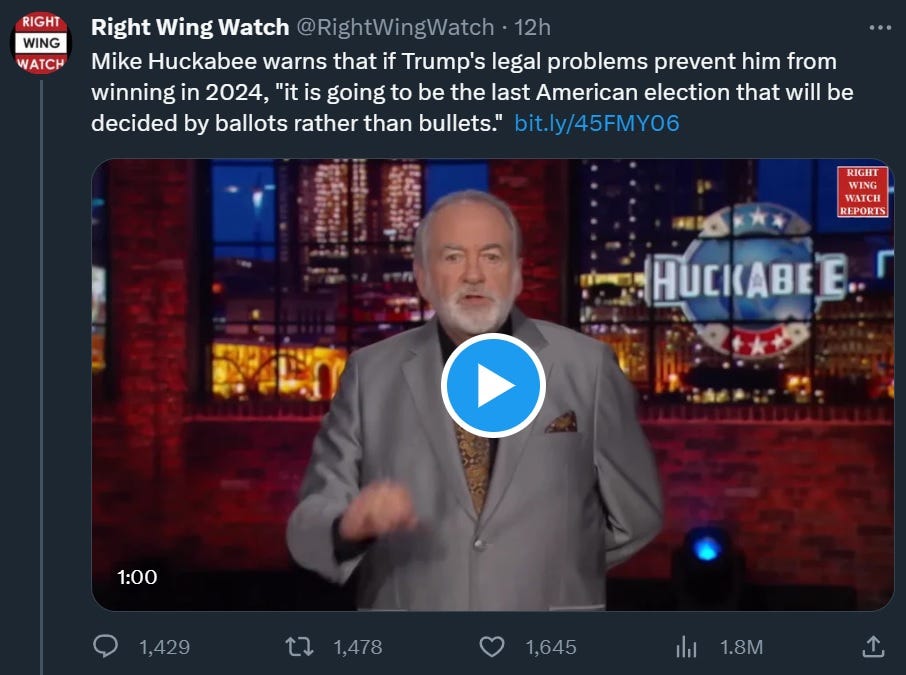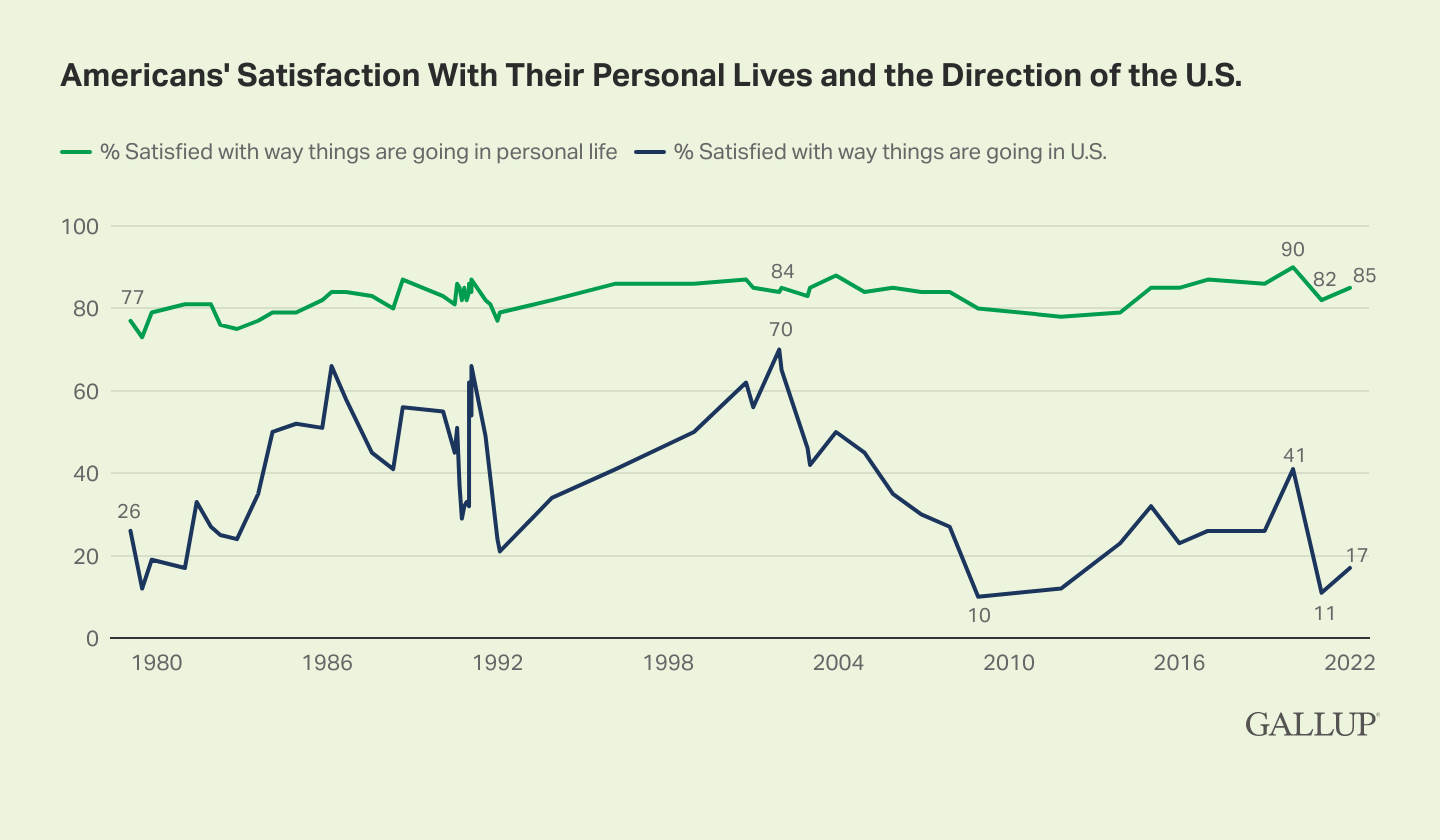The danger of another American civil war is low
Re-upping some arguments I've made before.
In the wake of Trump’s indictment in Georgia for election interference, the level of heated rhetoric from conservative media figures has reached a fever pitch. Civil war threats are flying fast and furious:
Six or seven years ago, during the early days of the Trump administration, this rhetoric would have seemed all too realistic. I could clearly see how the U.S. might fall into a civil war similar to the one that laid waste to Spain in the 1930s — a contested election leading to a split within the military that eventually spirals into an all-out contest for control of the country.
In 2023, though, I’m not so worried. The 2020 election came and went, and sure enough, it was contested, even with a tiny little bit of violence. But there were no signs of a split within the U.S. Armed Forces. There’s little reason to expect that any 2024 replay would turn out differently.
And if the U.S. Military doesn’t split and fight itself, the prospects for civil war are low. With liberal cities and conservative exurbs, and each type of place heavily dependent on the other, the country just isn’t set up for a “national divorce” like the one we had in 1860.
Nor does the conservative establishment have any appetite for civil war. Earlier this year the GOP quietly passed a key reform that will make it much harder for Donald Trump or anyone else to use fake electors to overturn presidential elections. And Trump-appointed judges have been handing out harsh sentences to people involved in the January 6th coup attempt. (This is exactly what I recommended right after 1/6, as a deterrent against future, more serious coup attempts.)
Anyway, I was thinking of writing a post about all of this, but much of it would cover ground that I’ve covered in three previous posts:
1. “The U.S. Military won't allow an insurrection” (7/14/2021)
2. “A Time of Troubles” (7/3/2022)
3. “The U.S. is starting to look more stable” (1/4/2023)
So I thought I’d just repost those posts — or the relevant sections — here. Fairly little has changed in my thinking since I wrote any of these.
The only thing I’ve really reevaluated is Trump’s enduring popularity; in the wake of the 2022 election, when Trump-backed candidates and election denialists lost big, I thought Trump’s popularity would wane. That was clearly wrong; Trump is still the odds-on favorite to win the GOP nomination despite his legal troubles, and the MAGA movement is still the most powerful faction in the conservative tent. But despite this depressing fact, I think my other reasons for thinking that the danger of a U.S. civil war are now pretty low remain as sound as ever.
So while we should still definitely be vigilant and on guard in 2024, I think we shouldn’t freak out about the civil war rhetoric emanating from the right.
Anyway, here are the three reposts:
The U.S. Military won’t allow an insurrection
(reposted from “The U.S. Military won't allow an insurrection”)
Four and a half years ago, in the wake of Trump’s electoral victory, I wrote a blog post worrying about the possibility of a civil war in America. I don’t like to write posts like that (or like the one I’m writing now); it’s just something one occasionally has to do, because the alternative is hiding under a rock and waiting for the storms of history to pass. Anyway, I had been reading a bunch of history books about the Spanish Civil War, and I fretted that liberals and leftists in the U.S. were walking into a similar catastrophe:
[L]ike Spain [before its Civil War], the military leans to the right (though perhaps not quite as much). In America, the right also controls most of the roughly 300 million privately owned guns.
This means that if the U.S. had a civil war along currently existing left-right lines - i.e., Republican voters vs. Democratic voters - the right would win. It would probably win more quickly and decisively than the Spanish right won…
I think many on the intellectual, elite left in America fail to realize this danger, or the probability of this scenario. From most left-leaning intellectuals I see only increasing stridency and demands for ideological purity…
I worry that this attitude, and these tactics, depend crucially on the assumption that we live in a constitutional, democratic regime that is so unshakably stable that raised fists, angry op-eds, and the ballot box will always be able to prevail. I worry that they have forgotten Mao's adage that "power grows out of the barrel of a gun," and that the other side - as the sides are currently drawn - has all the guns.
I advised liberals and leftists to moderate their tone, in the hope of winning over wavering centrists, especially in the military.
I think my message — that liberals needed to think through to the possibility of violent conflict, and not simply put it out of their minds — was a good one. And my advice not to give in to extremism and to build an ideological big tent, in order not to lose such a conflict, was and is sound advice. But I now think that my post was wrong in one huge, important respect: I underestimated the U.S. Military.
Like many liberals, I simply assumed that the conservative tilt of the people in the Armed Forces meant that if there were a Spain-style civil war between Right and Left, they would side with the Right. In fact, this probably is true for many Republican politicians around the country, who are becoming increasingly fanatical in their loyalty to Donald Trump. But the U.S. Military was a different breed. Trump started out his presidency with the support of a majority of the armed forces, but as the years shambled along, military opinion began to turn against him:
Crucially, the officer corps was even more strongly against Trump than the enlisted. At this point it started to become clear that we were not in a Spain 1936 type of situation — the military brass might split along partisan lines in the event of a conflict, but Trump would not have the majority on his side.
My dawning realization was reinforced during the George Floyd protests, when Trump tried to get the U.S. Military to act as riot police and quell the protests. I recall watching General Mark Milley, the Chairman of the Joint Chiefs, walk through D.C. and deliver a pro-protest message to a news crew. This was followed by a series of pro-protest messages from high-level active-duty members of every branch of the Armed Forces. A few weeks later it came out that Milley had shouted down Trump in the Oval Office.
After these pivotal events, I realized that the military was not on Trump’s side. The largest protests in American history, accompanied by looting in every major city, were not enough to induce the Armed Forces to betray their oaths and turn on the American people, even when exhorted to do so by a sitting President. To me, that was the decisive moment.
Now a new book by Carol Leonnig and Philip Rucker reveals just how very not-on-Trump’s-side the top brass were:
Milley spoke to friends, lawmakers and colleagues about the threat of a coup, and the Joint Chiefs chairman felt he had to be "on guard" for what might come.
"They may try, but they're not going to f**king succeed," Milley told his deputies, according to the authors. "You can't do this without the military. You can't do this without the CIA and the FBI. We're the guys with the guns."…
Milley viewed Trump as "the classic authoritarian leader with nothing to lose," the authors write, and he saw parallels between Adolf Hitler's rhetoric as a victim and savior and Trump's false claims of election fraud.
"This is a Reichstag moment," Milley told aides, according to the book. "The gospel of the Führer."
Ahead of a November pro-Trump "Million MAGA March" to protest the election results, Milley told aides he feared it "could be the modern American equivalent of 'brownshirts in the streets,'"…
After January 6, Milley participated in a drill with military and law enforcement leaders to prepare for the January 20 inauguration…
Milley told a group of senior leaders, "Here's the deal, guys: These guys are Nazis, they're boogaloo boys, they're Proud Boys. These are the same people we fought in World War II. We're going to put a ring of steel around this city and the Nazis aren't getting in."
This is far more extreme of a condemnation of Trump than even I was willing to make. Milley, who was close to the center of the action and interacted with Trump on a daily basis, made Hitler comparisons that rival the shrillest resistance libs on Twitter. For years, liberals on Twitter were called hysterical whenever they expressed opinions like this, but now we find that behind closed doors, top generals were thinking the same thing. Milley viewed the MAGA movement as Nazi-esque, and was prepared to crush it with force. That view might not have been universal among the top brass, but the reporting in the book implies that it was very common.
In my 2016 post, I posed the question to liberals: “You and whose army?” Now we have an answer: Our own army. The United States Armed Forces.
The Right seems to have realized this too. Rightist figures are increasingly condemning the military as being “woke”, taking aim at recruitment ads that emphasize diversity and accusing offers of distributing woke literature. Condemnations of top brass like Milley are becoming open and common:
On Twitter, it’s common to see right-wingers revile the military, or say that it’s “decaying”.
In a way, this is actually reassuring. If rightists have begun to feel, as I began to feel in 2020, that the U.S. Military as an institution is not on their side, it means that there will be no repeat of the Spanish Civil War in America. No Franco will return from Morocco to lead the forces of reaction and crush the Republic. Military personnel will continue to lean conservative, but esprit de corps and ideological commitment to the Constitution will prevent that conservatism from turning into Trumpism. And rightist demonization of the military will stiffen the brass’ resolve to resist future Trumpist encroachments. Also, because the military is consistently the country’s most trusted institution, the anti-military campaign will probably do the rightists few favors electorally.
Also, we can now be pretty sure that future coup attempts in America will not closely resemble 1930s Japan, and will not have similar outcomes. Recall that in Japan’s 1930s coups — the first of which were every bit as shambolic and doomed as the one on 1/6 — rightists created chaos in the hopes of forcing the civilian government to relinquish power to the military. Ultimately, though the coups were put down, the perpetrators succeeded in their objective. In the U.S., however, rightists know that giving the military dictatorial powers would work to their distinct disadvantage. And so they will attempt to seize power or create chaos by other means.
Anyway, there are important lessons for both liberals and leftists here. Both tend to be suspicious of the Armed Forces — liberals because we know that military personnel tend to lean conservative, and leftists because they see the military as an arm of U.S. imperialism. But I’ve come to believe that this suspicion — which I used to share, as evidenced by my 2016 post — is unhelpful. If there’s one message liberals need to hear in America, it’s that we’re not the Revolution any more — we’re the Establishment, and we need to assume the responsibility that comes with being the Establishment.
That means upholding and supporting key national institutions like the military, even when those institutions contain many conservatives in their ranks. Not supporting them jingoistically or unconditionally, but at a deep, fundamental level. And furthermore, it means realizing that conservatives, and conservatism, have a place in America and are not going away, even if we disagree with them; as long as everyone does their job and fights to repel those who would bring our system down, we can coexist. (As a side note, liberals should also rethink their suspicion of social media companies, which acted decisively to cut off Trump’s media access in the wake of 1/6; in many ways this was more decisive than the repelling of the mob at the Capitol.)
As for leftists, they should realize that the U.S. Military is no friend of fascists, and owns quite a lot of guns.
The hardening of the U.S. military against fascism does not mean the U.S. is out of the woods in terms of civil strife, chaos, and the danger of a fascist takeover. Far from it. The chief danger now is political — the system laid out in our Constitution has loopholes that could allow GOP-controlled state legislatures to send unelected electors to Washington in 2024 in support of Trump’s bid to retake the presidency, and these fake electors might be certified by a GOP-controlled Congress.
That would spark a constitutional crisis. It would be clear that a reinstallation of Trump in power via fake electors would spell the effective end of American democracy, and yet the increasingly lockstep support of Republicans for Trumpism, and the likely GOP victories in the 2022 midterms, might force the country to choose between the technicalities of Constitutional procedure and democracy itself. That is not a day I am looking forward to, but it’s a day everyone in America needs to be preparing for.
But the danger of a rightist military coup or a Spain-style disaster now seem happily remote. The U.S. Military is proving to be the same thing it was in World War 2 — a bulwark against totalitarianism. The robustness of this core institution in the face of extreme pressure should make us more optimistic about our nation’s survival and continued effectiveness.
Why there won’t be a “national divorce”
(reposted from “A Time of Troubles”)
Suggestions for a breakup of the union have come mostly from the political Right, but some progressives have started tiptoeing up to the idea as well. But it’s extremely unlikely to happen. First of all, the U.S. political divide isn’t really regional, as it was in the 1860s when we had our first civil war. It’s blue cities against a red countryside. Here’s the New York Times’ precinct-level election map from 2018:
You can see that except in a few areas, it’s a sea of red with dots of deep blue. That is not the kind of country that can easily split into regions. Any durable regional split would likely require a mass campaign of ideological cleansing — an analogue to the Partition of India, which killed up to 2 million people.
The U.S. economy could not sustain such a split. Supply chains have become so distributed throughout the country that every region of the country is dependent on a large number of other regions. Here’s a map of food supply chains from Lin et al. (2019):
You can see lots more supply chain maps on the FEW-View website, which shows where each city gets its products from. The short answer is that America is now an incredibly integrated economy in regional terms; any regional separation would cause absolute economic chaos. Additionally, red states would certainly covet the strategic ports of California and the North Atlantic states, while blue states would hunger (literally) after the farmland of the Midwest and Plains states.
All this means you shouldn’t pay too much heed to the people who talk about blue-state GDP vs. red-state GDP, as if this implies the blue side would triumph in a civil war. Yes, blue states, and especially blue cities, produce more of the nation’s output and are home to the nation’s most high-value industries and educated, highly capable workforces. But those industries would be far less lucrative in a “national divorce” scenario; who needs fancy financial products or search ads or the latest brand phone when there’s no food on the table or materials to fix roads? This is not like the 1860s, when the largely self-sufficient North could use its prowess in manufacturing and staple crops to overmatch the agrarian, backward South. The economic supremacy of today’s blue states is based on marginal thinking that would not hold in the case of a large disruption such as a civil war.
Thus, any major civil war is less likely to resemble the war of 1861-65 than the Spanish Civil War of 1936-39. Both sides will try to conquer the whole territory of the United States, and one side will succeed. That would be an incredibly bloody, costly, and savage affair.
The U.S. is not a chaotic, impoverished nation like pre-civil war Spain, Russia, China, etc. — or even like the U.S. of 1861. It’s a rich nation — one of the richest in the world, even after taking inequality into account. And while most Americans are dissatisfied with the state of the nation, most are satisfied with their own lives:
And polls clearly show that despite the ructions of the past decade, most Americans still like their country.
To throw that away in a civil war would be a tragedy of unprecedented proportions. That doesn’t mean it won’t happen. But it does mean that it’s incumbent on us to do everything we can to find a better path — a way to preserve our nation and live together in peace with people on the “other side” of the political divide.
Secret Congress slips a shiv into Coup 2
(reposted from “The U.S. is starting to look more stable”)
In terms of preserving stability, though, the most important bipartisan bill of all may have been one of those Secret Congress things. I was very hesitant to shout too loudly about the behind-the-scenes efforts to reform the Electoral Count Act, for fear that some right-wing news outlet would notice, and raise a hue and cry, and scuttle the whole thing. But now that ECA reform has passed as part of the recent omnibus appropriations bill, I can shout about how great this is — and what a good sign it is for institutional stability.
Trump’s attempt to overturn the 2020 election started with some lawsuits, but those were easily defeated. He then tried to pressure state-level GOP election officials to refuse to certify the election, but they mostly ignored him and certified it. He then attempted to get state legislatures to send fake electors to Congress in defiance of the will of their electorates; they refused. His last-ditch attempt was to attempt to persuade Republicans in the House and Senate to refuse to count the electoral votes, which might have delayed Biden’s inauguration and given Trump more room to maneuver. That also failed, despite the shambolic, ridiculous January 6th coup attempt. But any of those strategies might conceivably succeed in 2024.
That’s why in the aftermath of Trump’s failed autogolpe, the people trying to prevent a 2024 repeat — and there are very many of them, and they come from both parties — focused on reforming the Electoral Count Act. This reform would basically make it much harder for even a very partisan Congress to approve slates of fake electors nominated by hyperpartisan state legislatures, or to refuse to approve the real electors. The recent reform includes the following provisions:
The bill
Clarifies that the role of the vice president is purely ceremonial,
Raises the threshold for members of Congress to initiate objections to electoral results to one-fifth of each chamber,
Ensures there is one conclusive slate of electors from each state
And outlines a process for expedited court review of election results.
In September, the Senate Rules Committee additionally amended the bill to
Make U.S. Supreme Court review of any federal litigation over the certification of state electors discretionary rather than mandatory,
Ensure the judicial review procedure provided in the act doesn’t exclude litigation in other state and federal courts
And clarify the language around certification of electors to specify that during the counting of electoral college votes, Congress must treat the electors certified by a state and modified by any state or federal court relief as conclusive.
In a recent op-ed, the Washington Post’s Greg Sargent — who has been covering this issue obsessively, and whom I interviewed a year ago — explains why these reforms were key to preventing a repeat. And he also points out something potentially even more important — the fact that the GOP supported ECA reform, with very little debate, shows that there’s very little appetite for a Trumpist coup among Republican politicians:
Strikingly, [ECA reform] is happening with little noise from right-wing media or MAGA-loyal lawmakers. A bipartisan group of senators negotiated these reforms for months with the support of Senate Minority Leader Mitch McConnell (R-Ky.), and they will likely be backed by many or even most GOP senators…
Why is all this happening? One reason: This is an easy way for Republicans to do something about the Trump threat. It’s highly technical and doesn’t require direct condemnation of Trump himself. Attaching reform to the omnibus avoids a stand-alone vote on it, which could subject Republicans supporting it to more attacks…
In effect, Senate Republicans are poised to join Democrats in Trump-proofing our elections behind his back.
In other words, ECA reform shows that the true threat to institutional stability comes not from the people at the top of the Republican party (other than Trump himself), but from the riled-up Trump loyalist voters at the base of the party. And this movement is getting weaker by the day.











True civil war is a nonstarter for all the reasons you identified, most especially geography.
However, the federal government is completely sclerotic and getting worse. At some point, a red state (or a few of them) will say "we've had enough". Today, a federal judge in Austin ruled that Gov Abbot has to remove his border barrier. What if Abbot simply refuses -- "let's see them enforce it" style. What happens when the Army Corp of Engineers goes to remove the barriers and the Texas National Guard refuses to allow it? And that's just one of many examples. We could have had something like that with the states that legalized marijuana 10 years ago, but the feds wisely decided not to go to the wall over it. The Left will go to the wall over immigration and most of the culture war.
Secondly, what happens if Trump actually manages to win 2024? Unlikely, I know. But the Democratic Party has spent 7 years convincing themselves that Trump is Hitler, and you CAN NOT turn over power to Hitler, even if he does win an election. Would the Democratic Party peacefully transfer power back to Donald Trump? If the leadership decides to, how will they talk their armed wing (that's what antifa actually is) off the ceiling? I don't know. I don't think they can.
The long-term solution is federalism, a return to "live and let live" on a wide variety of issues. I believe the Right could get there. It would be hard on LGBT and abortion, but there's a strong states rights and limited government tradition among conservatives. The Left has a harder time. Progressivism believes they're pursuing the "best practices" to run society, a universalism that makes any return to "live and let live" very hard.
How would you take into account the behavior of Senator Tubberville with halting military promotions? The pro-authoritarians may use the instrument of promotions to place their own Francos in place or hinder those opposed.